
What's driving the Inequality crisis? There's a variety of intersecting issues but here in this thread are five key systems that cause this crisis, we'll focus on one a day over the course of the week.
#FightInequality #InequalityVirus
#WEF21
#FightInequality #InequalityVirus
#WEF21
1. PATRIARCHY
Sexist patriarchal attitudes & norms place the needs of men first. Those ten millionaires that have gained half a TRILLION DOLLARS since the pandemic started. Any of them women??
Of course not!
Sexist patriarchal attitudes & norms place the needs of men first. Those ten millionaires that have gained half a TRILLION DOLLARS since the pandemic started. Any of them women??
Of course not!
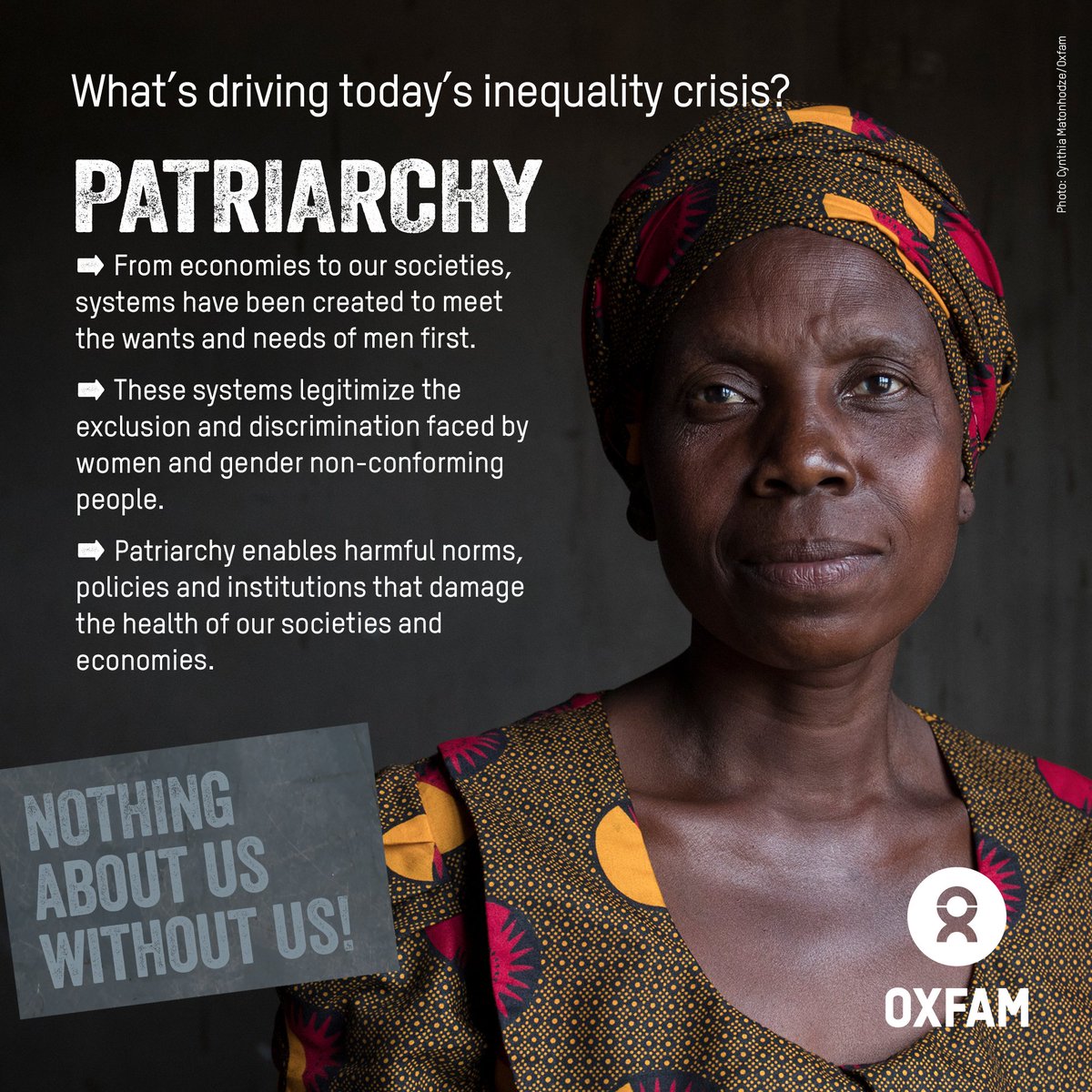
Globally, women are overrepresented in low-paid precarious professions that have been hardest hit by the pandemic. If women were represented at the same rate as men in these sectors, 112 million women would no longer be at high risk of losing their incomes or jobs. 
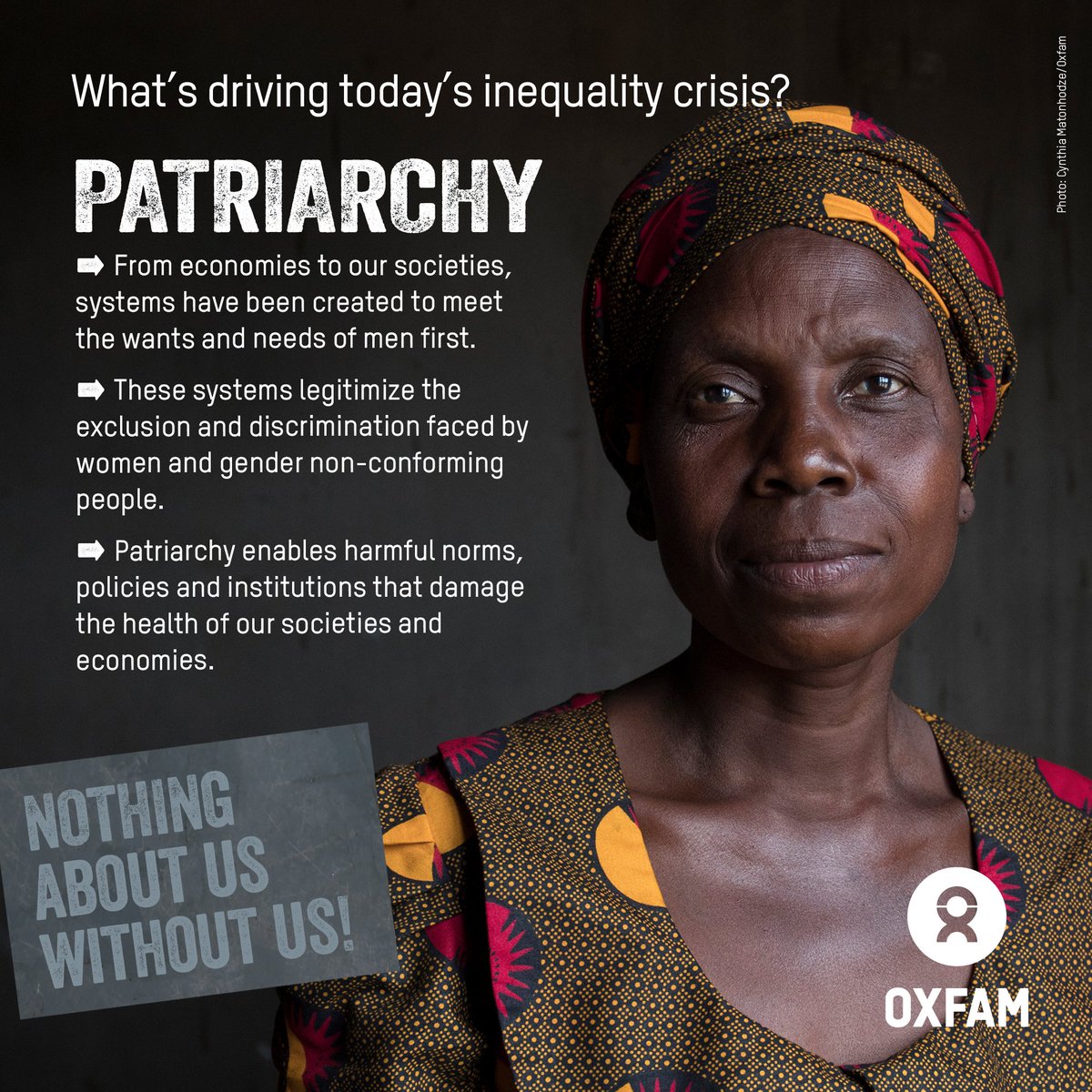
Women also make up roughly 70 percent of the global health and social care workforce − essential but often poorly paid jobs that put them at greater risk from #COVID19.
Not saying all nurses are women but this is the sort of example you can find right through the care sector.
Not saying all nurses are women but this is the sort of example you can find right through the care sector.
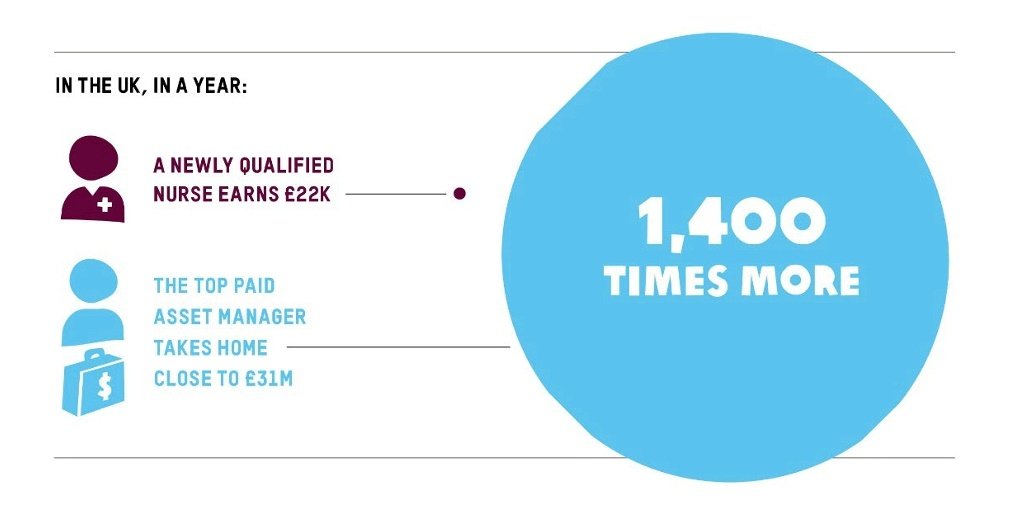
These roles also put women at particular risk, especially where access to PPE has been limited.
Women are also frequently the principal caregivers when household members fall sick, which puts them at greater risk of being exposed to the #coronavirus themselves.
Women are also frequently the principal caregivers when household members fall sick, which puts them at greater risk of being exposed to the #coronavirus themselves.
Greater unpaid care responsibilities214 & the resulting gender-differentiated exposure to work & household stressors contribute to poor mental health in women, including depression. As well as increased exposure to the risk of violence.
Women & girls also bear the brunt of reduced access to sexual & reproductive health services during the #COVID19 pandemic, which increases the risk of unwanted pregnancies, sexually transmitted infections & complications during pregnancies.
It's estimated that maternal deaths have increased by between 8% and 39% per month in Lower & Middle Income Countries, due to #COVID19 related reductions in perinatal care.
In Nepal, from March-May 2020, lockdowns halved the number of births in health facilities, & contributed to a 3-fold increase in risk of neonatal death
sciencedaily.com/releases/2020/…
sciencedaily.com/releases/2020/…
If anything this pandemic has reinforced rather than challenged the patriarchy.
It's led to increased gender based violence, reduced access to resources, & avoidable death for women.
All because societies -around the world- take these issues as "the way things are, and must be."
It's led to increased gender based violence, reduced access to resources, & avoidable death for women.
All because societies -around the world- take these issues as "the way things are, and must be."
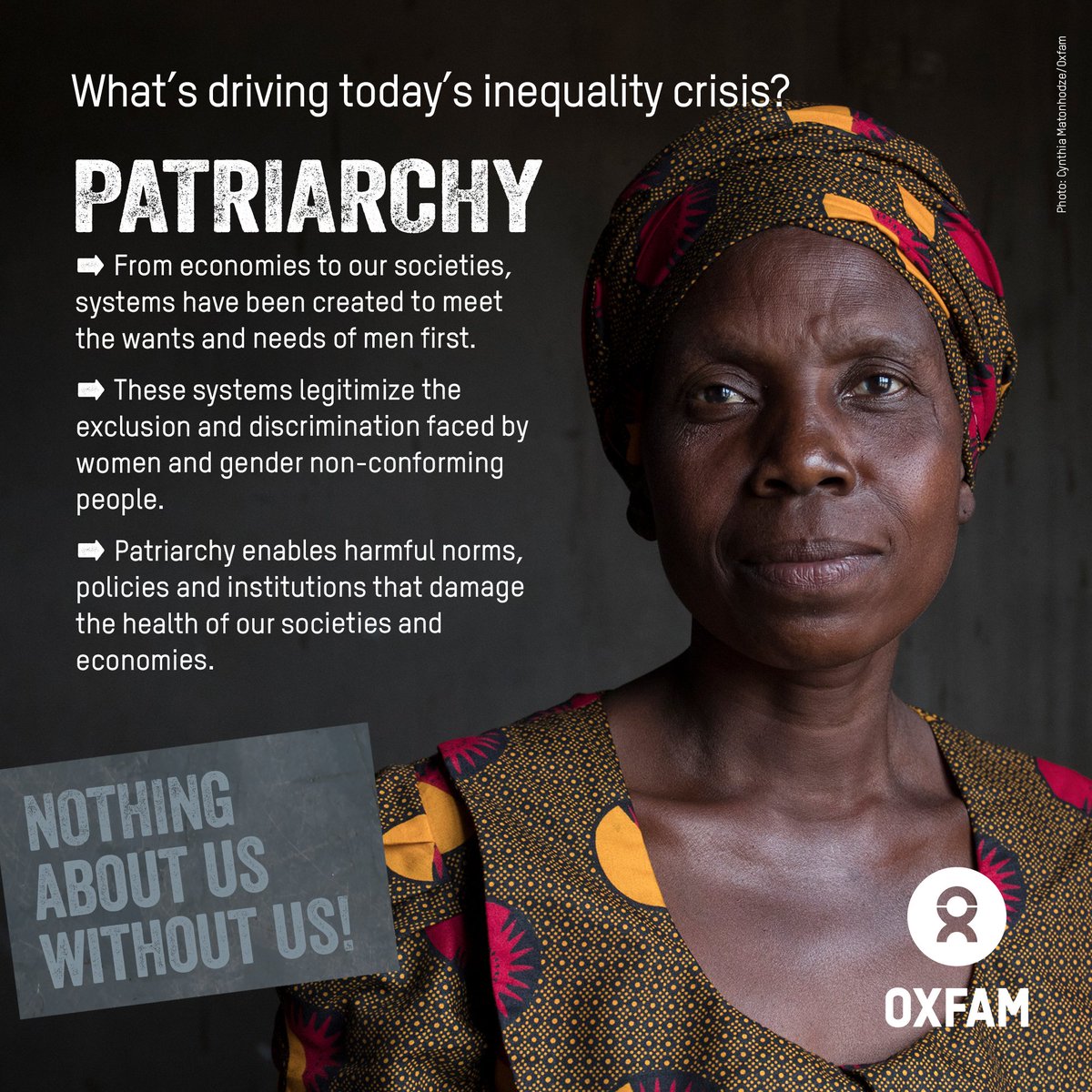
Second driver of the Inequality crisis--->>
2. WHITE SUPREMACY
Centuries of colonialism imposing a capitalist system by white people, for white people.
White supremacy ensures that white people enjoy rights and financial advantages that other racial & ethnic groups do not
2. WHITE SUPREMACY
Centuries of colonialism imposing a capitalist system by white people, for white people.
White supremacy ensures that white people enjoy rights and financial advantages that other racial & ethnic groups do not

Racism is also a pandemic.
Black people, Afro-descendants, Indigenous Peoples are more likely to contract #COVID19, & to suffer the worst consequences.
In USA, hospitalization rates due to COVID-19 were 5 times higher for Black, Latinx, & Native Americans than for White people.
Black people, Afro-descendants, Indigenous Peoples are more likely to contract #COVID19, & to suffer the worst consequences.
In USA, hospitalization rates due to COVID-19 were 5 times higher for Black, Latinx, & Native Americans than for White people.
In 🇧🇷, Pardo & Black people admitted to hospital w/ #COVID19 had higher risk of mortality than White people. Brazilians of Afro-descent are 40% more likely to die of COVID than White Brazilians. If their death rate had been equal over 9,200 Afro-descendants would still be alive 
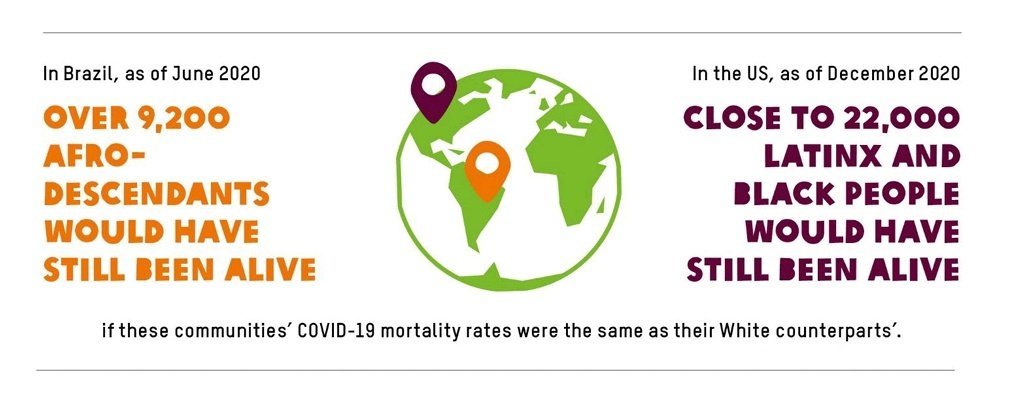
By April 2020, the % of confirmed #COVID19 cases among Somalis in Norway & Finland was 10 times their % share of the population, & they accounted for a significant proportion of deaths....
In the Amazon region, the number of #COVID19 deaths among Indigenous populations increased from 113 to 2,139 in barely 6 months, an increase two-and-a-half times that registered among the general population.
Just some examples of White Supremacy in practice. This isn't a mistake, the capitalist economy is set up specifically to benefit a small set of privileged white men at the "top", & to marginalise & exploit. Colonialism set this up on purpose & these are the results. 

Third driver of the Inequality crisis
3. NEOLIBERALISM
Creation of the myth of meritocracy, & push to keep"government interference"out of the"economic free market"
Neoliberalism blames individuals for the systemic oppressions they face, & absolves govts of resp to ensure fairness
3. NEOLIBERALISM
Creation of the myth of meritocracy, & push to keep"government interference"out of the"economic free market"
Neoliberalism blames individuals for the systemic oppressions they face, & absolves govts of resp to ensure fairness
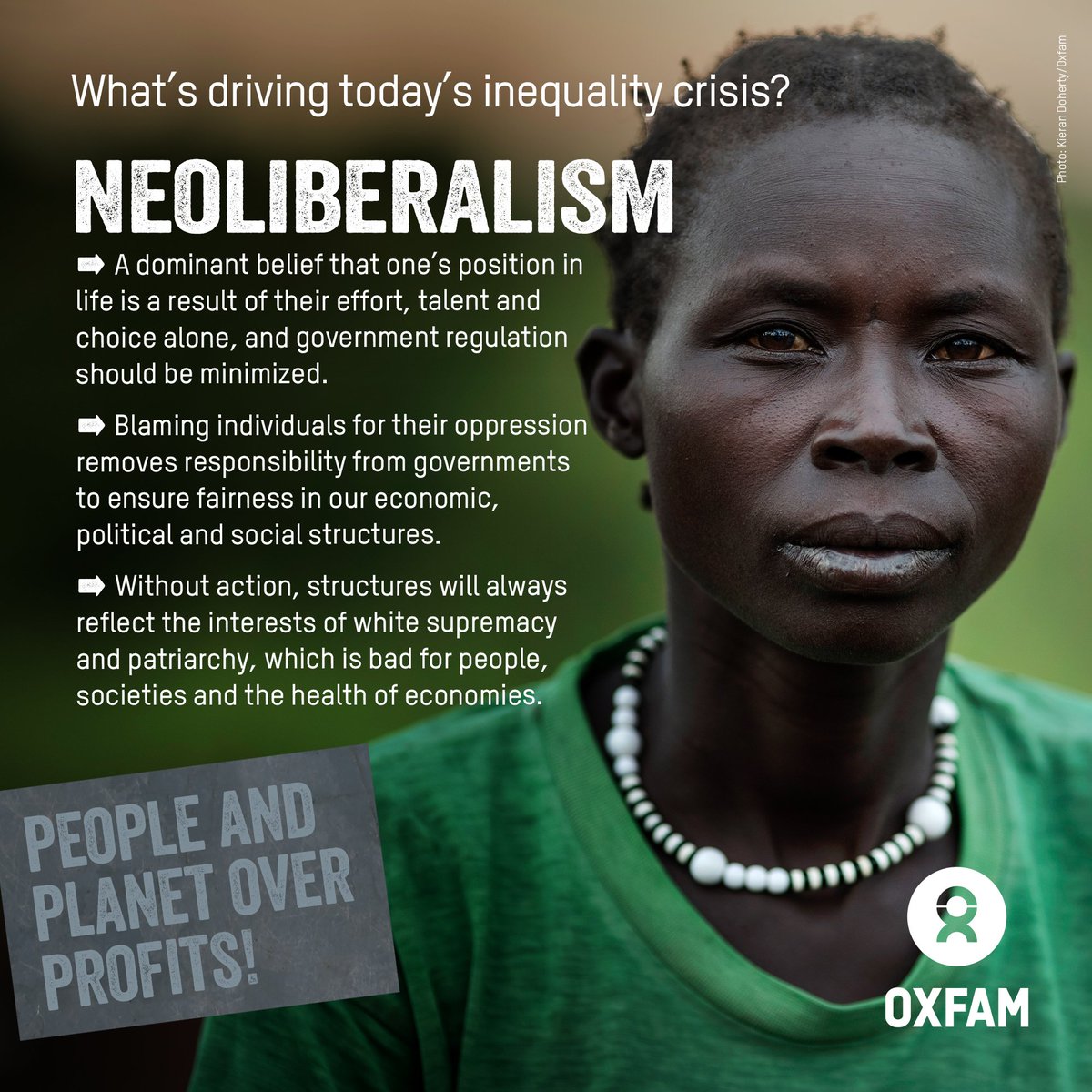
Neoliberalism is driven in part by the first two drivers in this series:
1. Patriarchy and 2. White Supremacy.
Which means white men are privileged to thrive while women, racialized, and other marginalised groups are exploited for the benefit and enrichment of the elites.
1. Patriarchy and 2. White Supremacy.
Which means white men are privileged to thrive while women, racialized, and other marginalised groups are exploited for the benefit and enrichment of the elites.
This system drives a relentless accumulation of wealth & income at the top,while squeezing those at the bottom & fuelling poverty. Despite a doubling of GDP since 1990, in low- and lower-middle-income countries, over half of workers still live in poverty
This economic model,based on unequal & carbon-intensive growth,is accelerating the #climatecrisis, to enrich the already affluent, rather than reducing poverty. The richest 1% were responsible for 15% of emissions 1990-2015-more than twice as much as the poorest half of humanity 
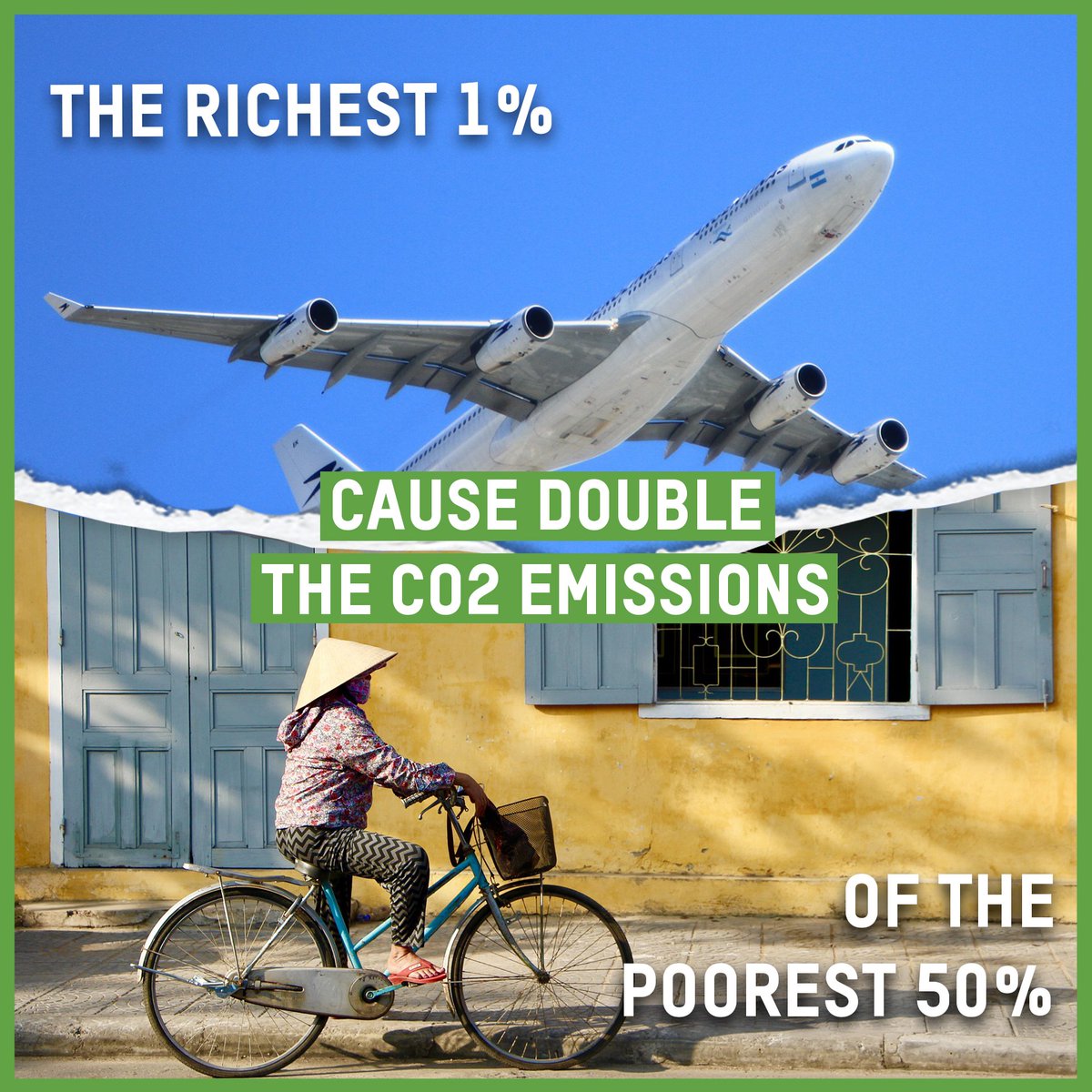
Neoliberal economics disregards existence of identities,instead reflecting interests of white supremacy & patriarchy,& diminishes the role of power associated w/ these identities.These systems sustain interlinked forms of inequality that are the root cause of poverty & injustice
Neoliberalism deconstructed political categories of race & gender to prioritize the idea of individualism & effort. This assumes that markets are self-regulating,fair,colour blind & gender blind. It states that a person´s position in life is the product of effort,talent & choice.
Neoliberalism is built on the assumption that race or gender are not an issue. As @DarrickHamilton puts it, the neoliberal ideology promises economic prosperity will act as ‘a rising tide that lifts all boats’, but in the US, this promise never materialized for Black people. 
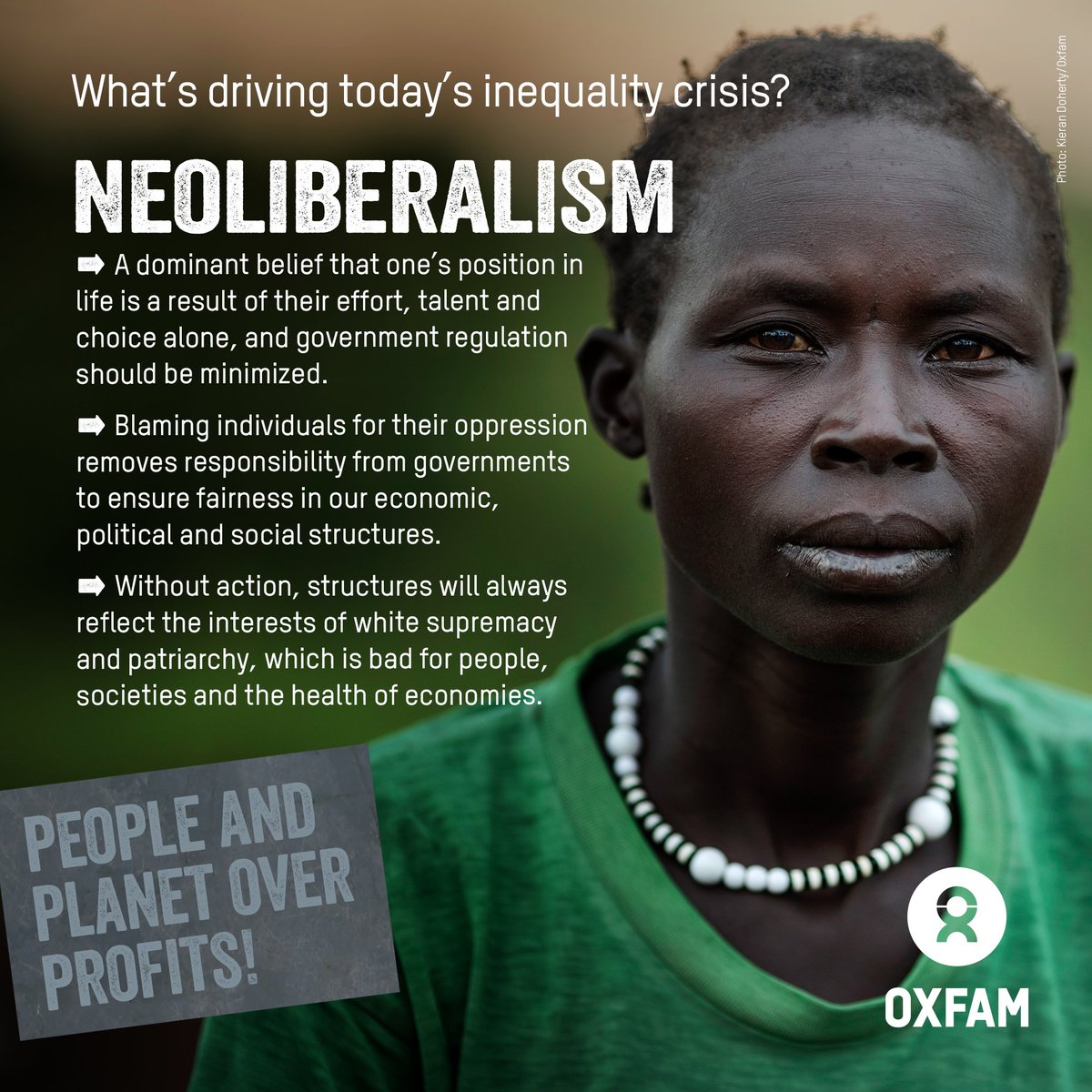
Fourth driver of the Inequality crisis
4. AUSTERITY
Framing the economic norm as neoliberalism downplaying the role of governments in making the economy fairer, means that governments are pushed/pulled to make cuts in public spending, especially during inevitable economic crisis.
4. AUSTERITY
Framing the economic norm as neoliberalism downplaying the role of governments in making the economy fairer, means that governments are pushed/pulled to make cuts in public spending, especially during inevitable economic crisis.
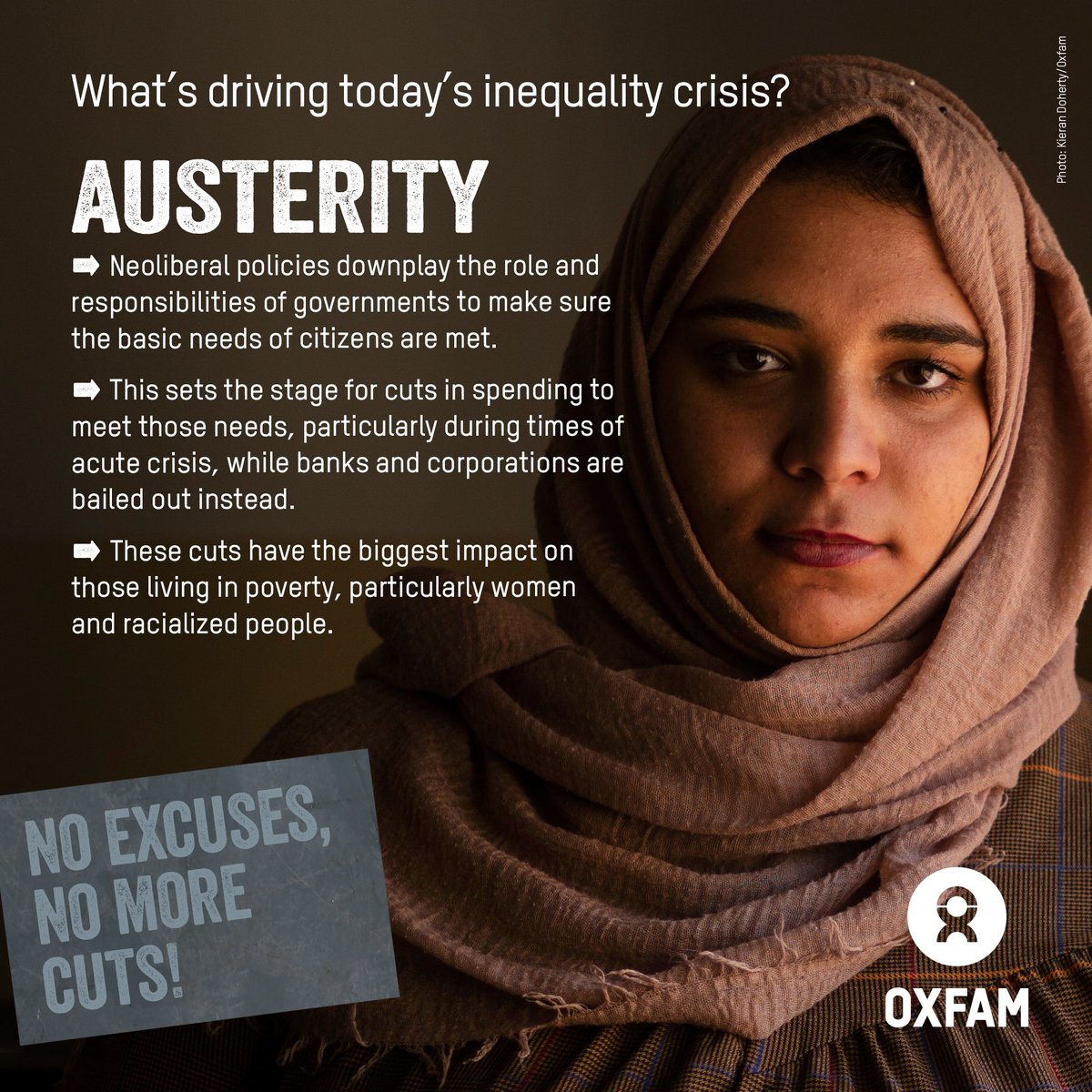
BUT austerity cuts affect the poorest while the same austerity is not applied to elites like the banks who get bailed out. A comprehensive study of government measures in the decade following the 2008 financial crisis found austerity measures affected 75% of the global population
These included cutting pensions, cutting wages of teachers & health workers, cutting subsidies & benefits & reducing labour rights. The decade since 2010 has seen increase in rates of regressive VAT, combined w/ reductions in tax rates for the richest corporations & individuals
Austerity policies lead to increased inequality, with disproportionate impacts on women & racialized groups.
Among other negative impacts, these policies have been blamed in part for the rise in populist, authoritarian, misogynist & racist politics.
opendemocracy.net/en/5050/auster…
Among other negative impacts, these policies have been blamed in part for the rise in populist, authoritarian, misogynist & racist politics.
opendemocracy.net/en/5050/auster…
Had countries increased taxation of the richest, they may have avoided austerity measures.
@Oxfam calculates that in Morocco a 2% tax on net wealth would've raised $6.17bn between 2010 & 2019, which could've been used to extend mandatory health insurance to 7.5million more people
@Oxfam calculates that in Morocco a 2% tax on net wealth would've raised $6.17bn between 2010 & 2019, which could've been used to extend mandatory health insurance to 7.5million more people
Govt bailouts & rescue packages have also supported wealthy polluting industries.
G20 countries had pledged $251bn to fossil fuels as part of their recovery packages by Nov 2020.
G20 countries had pledged $251bn to fossil fuels as part of their recovery packages by Nov 2020.
This kind of action protects these companies & their rich shareholders from the worst impacts of the crisis, socializing their losses, treating these as a responsibility that society must shoulder-through taxpayer-funded bailouts-while they continue to destroy the planet.
As lower-income countries struggle to deliver essential services & social protection that citizens need, people living in poverty, women & marginalized groups, pay the biggest price. Patriarchal, white supremacist neoliberalism & austerity are destroying lives.
#InequalityVirus
#InequalityVirus
Despite this, more austerity is being planned:
@Oxfam analysis shows that by Sept 2020, 84% of the @IMFNews's #COVID19 loans were encouraging, & in some cases requiring, countries to adopt austerity measures in the aftermath of the health crisis
oxfam.org/en/blogs/virus…
#COVID19
@Oxfam analysis shows that by Sept 2020, 84% of the @IMFNews's #COVID19 loans were encouraging, & in some cases requiring, countries to adopt austerity measures in the aftermath of the health crisis
oxfam.org/en/blogs/virus…
#COVID19
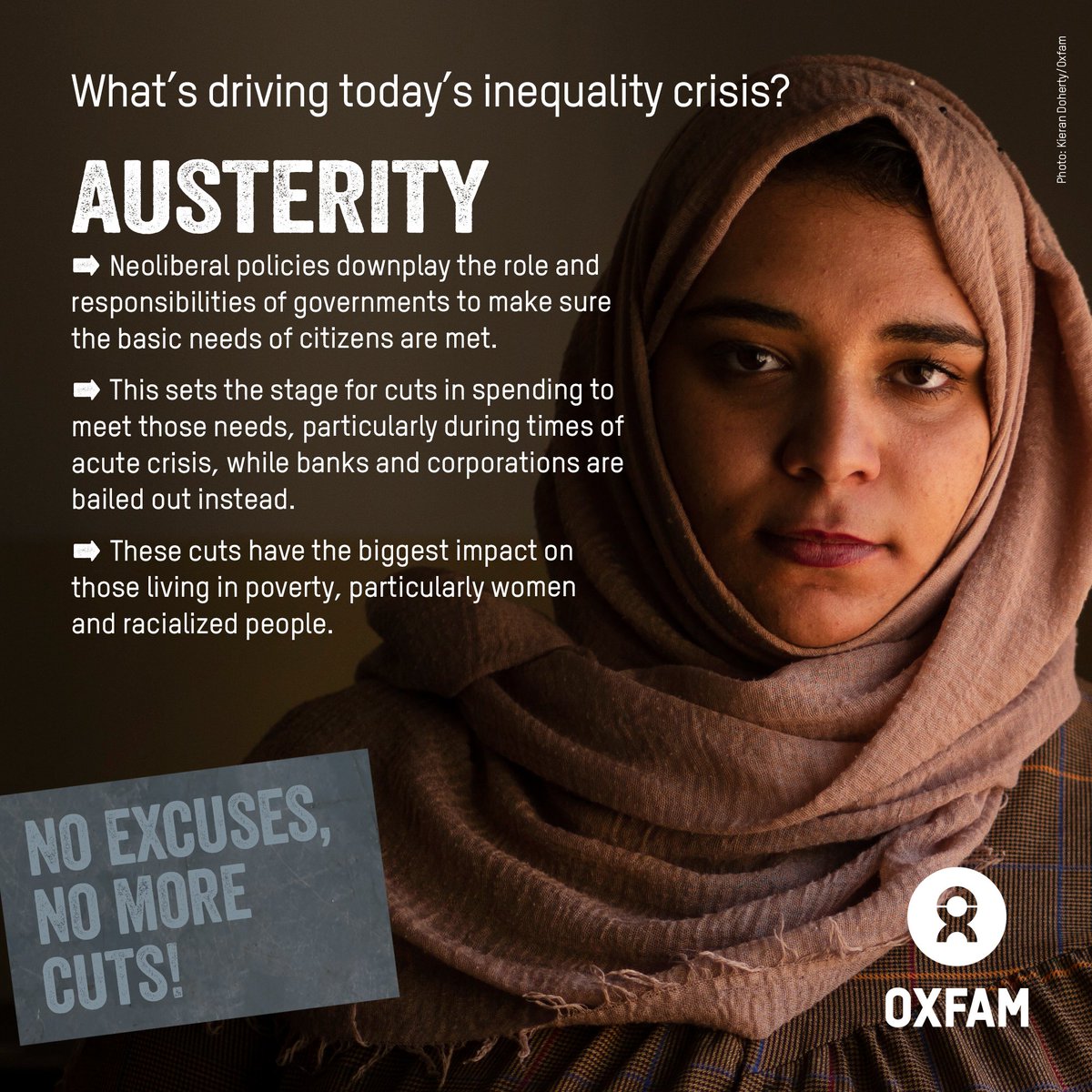
Rounding off five of the drivers of the Inequality crisis
5. THE PANDEMIC
None of us are strangers to the impacts the pandemic is having on our lives, but it is leading us to increased inequality in almost every country around the world at once for the first time in history.
5. THE PANDEMIC
None of us are strangers to the impacts the pandemic is having on our lives, but it is leading us to increased inequality in almost every country around the world at once for the first time in history.

#COVID19 has exposed, fed off & increased existing inequalities of wealth, gender and race. Over 2 million people have died, & hundreds of millions of people are being forced into poverty while many of the richest – individuals & corporations – are thriving.
#InequalityVirus
#InequalityVirus
The wealth of the top 1,000 billionaires, a small group of mostly white men, has recovered to pre-pandemic levels in only nine months.
Worldwide, billionaires saw their wealth increase by $3.9tn 18 Mar-31 Dec 2020.
Worldwide, billionaires saw their wealth increase by $3.9tn 18 Mar-31 Dec 2020.
Their total wealth now stands at $11.95tn, equivalent to what G20 governments have spent in response to the pandemic.
Mar-Aug 2020, billionaires in Middle East & North Africa increased their wealth by 20%,more than double IMF emergency financing to the region during that period.
Mar-Aug 2020, billionaires in Middle East & North Africa increased their wealth by 20%,more than double IMF emergency financing to the region during that period.
Meanwhile people living in poverty will become even poorer as a result of the #coronavirus. Recent estimates show the number of people living on less than $5.50 a day could have increased by between more than 200 million to half a billion in 2020.
The pandemic has exacerbated the patriarchal white supremacist neoliberal agendas that have legitimised austerity policies that created an inequality crisis in the first place.
That's five drivers of the crisis.
Question is what can we do about this?
Another way is possible.
That's five drivers of the crisis.
Question is what can we do about this?
Another way is possible.

Getting back to this - what can we do about it?
#COVID19 caused large scale rupture across societies & economies. Ppl talk of "build back better" "better" is fine, but building carbon intensive infrastructure & legacy manufacturing,& rampant consumerism got us into this mess
#COVID19 caused large scale rupture across societies & economies. Ppl talk of "build back better" "better" is fine, but building carbon intensive infrastructure & legacy manufacturing,& rampant consumerism got us into this mess

We don't want to go"back"to where we were before, but instead we need to look for a gender just, racially just, climate just future.
First things first:we need a #PeoplesVaccine, safe, effective, for everybody, now. This means opening up tech & knowledge, & rich countries sharing
First things first:we need a #PeoplesVaccine, safe, effective, for everybody, now. This means opening up tech & knowledge, & rich countries sharing

People everywhere are also increasingly realising that these major threats are all consequences of our man-made, unsustainable economic model, which puts profit before people & planet.
Millions of people across the globe are mobilising for change, for climate action, & against inequality, racism, patriarchy.
carnegieendowment.org/publications/i…
carnegieendowment.org/publications/i…

Global polling reveals #COVID19 has changed people’s priorities for the future.And support for policies to transform society:higher taxes for the richest,universal basic income,universal public services, reduction of corporate power,empowering workers,& a green economic recovery
Some more polling info:
-86% of people in 27 high/middle-income countries want to see the world become more sustainable & equitable,rather than revert to the status quo
-64% in 11 high/middle-income countries agree‘something must be done to fairly distribute our country’s wealth’
-86% of people in 27 high/middle-income countries want to see the world become more sustainable & equitable,rather than revert to the status quo
-64% in 11 high/middle-income countries agree‘something must be done to fairly distribute our country’s wealth’
-In Argentina 8 out of 10 SMEs support a wealth tax
-71% of Europeans support a universal basic income
-In UK, 70% support wage cap limits at £100k, £200k or £300k
-In several countries,inc India,Mexico,China,Brazil, South Africa,support for a green economic recovery is +80%
-71% of Europeans support a universal basic income
-In UK, 70% support wage cap limits at £100k, £200k or £300k
-In several countries,inc India,Mexico,China,Brazil, South Africa,support for a green economic recovery is +80%
Now's the time to rip up the rulebook,& invest to build a more equal,inclusive & sustainable world. Now is the time to dismantle structural racism & patriarchy,design democratic processes which ensure the rights of all people.
OK I hear you say
Practically what does this mean?
OK I hear you say
Practically what does this mean?
5 Steps to a Better World
1. Reduce inequality & value what matters
Billionaires are a sign of economic failure - not economic success. A radical and sustained reduction in inequality is the indispensable foundation of our new world.
1. Reduce inequality & value what matters
Billionaires are a sign of economic failure - not economic success. A radical and sustained reduction in inequality is the indispensable foundation of our new world.
Governments must build economies that work for poor black women, not just rich white men. They must move beyond an obsession with GDP & start to value what really matters, such as the millions of hours of unpaid care work done by women, which enables the wealthiest to prosper.
The @WorldBank has calculated that if countries act now to reduce inequality, 860 million fewer people will be living in poverty by 2030 than if it were left to increase.
2. Invest in free universal public services
It is not just diseases, but social injustice that kills people. The #coronavirus crisis exposed the inability of our deeply unequal economies to work for all.
Govts must abandon brutal and unsustainable austerity policies.
It is not just diseases, but social injustice that kills people. The #coronavirus crisis exposed the inability of our deeply unequal economies to work for all.
Govts must abandon brutal and unsustainable austerity policies.
Govts must ensure peoples’ wealth, gender or race doesn't dictate their health or education. Instead,they must invest in free quality public services,to reduce poverty & inequality.
Cancelling debts would release $3bn/month for poor countries to invest in free healthcare for all
Cancelling debts would release $3bn/month for poor countries to invest in free healthcare for all
3. Ensure dignified work & fair wages for all
Inequality should be prevented from happening in the first place. Businesses should be redesigned to prioritise society, rather than ever greater payouts to rich shareholders.
Inequality should be prevented from happening in the first place. Businesses should be redesigned to prioritise society, rather than ever greater payouts to rich shareholders.
We need living wages, & far greater job security, w/ labor rights, sick pay, & unemployment benefits.
Govts & corporations must recognize, reduce & redistribute the underpaid and unpaid care work that is done predominantly by women.
Govts & corporations must recognize, reduce & redistribute the underpaid and unpaid care work that is done predominantly by women.
4. Make the richest pay their fair share of tax
We must look back on this crisis as the moment when we finally started to tax the rich fairly,increased wealth & financial transaction taxes,& ended tax dodging.
Progressive taxation of richest members of society is the cornerstone
We must look back on this crisis as the moment when we finally started to tax the rich fairly,increased wealth & financial transaction taxes,& ended tax dodging.
Progressive taxation of richest members of society is the cornerstone
This will enable investment in a green,equitable future
A tax on excess profits earned by corporations during the pandemic could generate $104bn,enough to provide unemployment protection for all workers,& financial support for all children & elderly ppl in the poorest countries
A tax on excess profits earned by corporations during the pandemic could generate $104bn,enough to provide unemployment protection for all workers,& financial support for all children & elderly ppl in the poorest countries
5. Tackle the climate crisis
Climate breakdown is the biggest threat ever to human existence. It is already destroying livelihoods & killing the poorest, economically excluded & historically oppressed communities.
Climate breakdown is the biggest threat ever to human existence. It is already destroying livelihoods & killing the poorest, economically excluded & historically oppressed communities.
Government responses to #Covid19 represent the last chance to drive carbon emissions down at the unprecedented pace that is required & build a green economy that prevents further degradation of our planet and preserves it for our children.
We need an end to all subsidies for fossil fuels and invest in low carbon sectors to create millions of new jobs.
In the US investing $1 million in renewables creates nearly 3 times as many jobs as investing the same amount in fossil fuels.
In the US investing $1 million in renewables creates nearly 3 times as many jobs as investing the same amount in fossil fuels.
There's a plan, it's not wild-it's in our reach,if we take ambitious action.
Move on from the racist,patriarchal,neo colonial,neoliberal,oppressive economic model of the last & take the path to a bright new future
Details in @Oxfam's The Inequality Virus
oxfam.org/en/research/in…
Move on from the racist,patriarchal,neo colonial,neoliberal,oppressive economic model of the last & take the path to a bright new future
Details in @Oxfam's The Inequality Virus
oxfam.org/en/research/in…
@threadreaderapp unroll please
• • •
Missing some Tweet in this thread? You can try to
force a refresh


